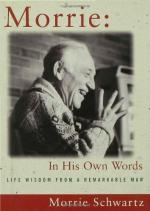
|
| Name: _________________________ | Period: ___________________ |
This test consists of 15 multiple choice questions and 5 short answer questions.
Multiple Choice Questions
1. In Chapter 5, Schwartz states that one must come to terms with whom?
(a) Doctors and nurses.
(b) Those with whom you have had difficult relationships.
(c) God.
(d) All friends and family.
2. According to Schwartz, what is the most constant feeling one has when in declining health?
(a) Hope.
(b) Frustration.
(c) Depression.
(d) Fear.
3. How does one handle stressful emotions, according to Schwartz?
(a) By relaxing and accepting that achievement is going to come later than expected.
(b) By informing friends and family that help is needed.
(c) By releasing anger.
(d) By seeking professional help.
4. Schwartz explains that one may want what occurrence to happen?
(a) Unexplained happiness.
(b) Silence from friends and family.
(c) Death.
(d) A bad prognosis.
5. What action does Schwartz ask his friends and family to perform when he is feeling up or down?
(a) To keep in touch with him.
(b) To encourage him.
(c) To hug him.
(d) To keep him in reality.
6. In Chapter 1, Living with Physical Limitation, Schwartz advises the reader that they will first recognize ________.
(a) Restraint in natural impulses.
(b) Intense pain.
(c) Memory loss.
(d) Lessening or loss of physical power.
7. In Chapter 4, Schwartz explains that one's feelings are going to become _______.
(a) Unhealthy.
(b) Contradictory.
(c) Nonexistent.
(d) Stable.
8. Schwartz explains that learning to grieve for yourself is just as important as grieving for whom?
(a) Good friends.
(b) Anyone else.
(c) Family pets.
(d) Close family members.
9. Schwartz informs his readers to not become so _____ with one's body.
(a) Preoccupied.
(b) Aggrevated.
(c) Superstitious.
(d) Careless.
10. Schwartz watches what part of his body deteriorate slowly?
(a) His nerves.
(b) His sight.
(c) His sense of hearing.
(d) His sense of taste.
11. When Schwartz first learned of his sickness, what did he decide to start?
(a) Documenting his declining health.
(b) Informing others that he would survive this disease.
(c) An annual blood drive.
(d) A charity foundation.
12. Schwartz stresses the importance of ______ one's self.
(a) Forgiving.
(b) Not forgetting.
(c) Remembering.
(d) Keeping,
13. Schwartz describes the action of hiding grief as _____.
(a) A pointless action.
(b) An unhealthy action.
(c) A healthy action.
(d) A false reality.
14. How long was Schwartz a professor?
(a) Five decades.
(b) Three decades.
(c) Four decades.
(d) Two decades.
15. How does Schwartz suggest one in declining health deal with anger?
(a) Talk about it with others.
(b) Let it pass.
(c) Continue to let it grow.
(d) Try to forget about it.
Short Answer Questions
1. Schwartz stresses the importance of coming to terms with __________.
2. Unresolved grief can turn good grief into what type of grief?
3. In Chapter 4, Schwartz expresses the importance of acknowledging what type of feelings?
4. Acknowledging all feelings is going to cause one to realize what information about their loved ones?
5. As described in Chapter 2, ______ helps Schwartz deal with his disease.
|
This section contains 466 words (approx. 2 pages at 300 words per page) |

|




